We may not have the course you’re looking for. If you enquire or give us a call on 01344203999 and speak to our training experts, we may still be able to help with your training requirements.
Training Outcomes Within Your Budget!
We ensure quality, budget-alignment, and timely delivery by our expert instructors.
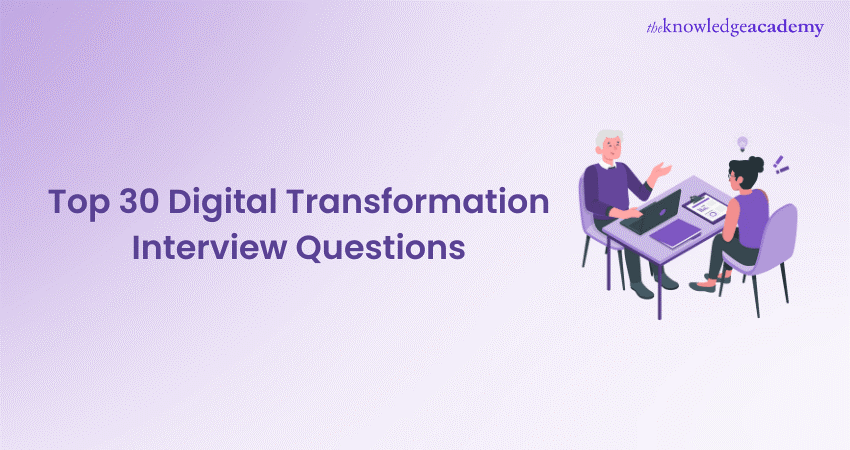
Businesses continuously adapt to stay ahead of the curve, making Digital Transformation a critical strategic initiative. Understanding this concept has become essential for those looking to lead their organisations into the future. This blog explores some of the most important Digital Transformation Interview Questions that can help you gauge the depth of knowledge and readiness for the digital challenges ahead. We ensure you are well-equipped to handle the complexities of modern business environments.
Table of Contents
1)Most Common Digital Transformation Interview Questions
a) What is your understanding of Digital Transformation?
b) Can you describe your involvement in Digital Transformation projects?
c) What are the four key pillars of Digital Transformation?
d) What factors are currently propelling Digital Transformation forward?
e) How do you determine which Digital Transformation projects to prioritise?
f) What approaches do you use to ensure the sustainability and lasting impact of Digital Transformation efforts?
g) What challenges are most common in Digital Transformation processes?
h) What type of organisational culture supports Digital Transformation?
i) Why is it important for companies to pursue Digital Transformation?
2) Conclusion
Most Common Digital Transformation Interview Questions
Here are the most frequently asked Digital Transformation Interview Questions and answers, crucial for moving businesses towards success in a rapidly changing digital landscape.
1) What is your understanding of Digital Transformation?
The interviewer wants to assess your comprehension of Digital Transformation as a concept, including its scope and significance in the business landscape.
Sample Answer: Digital Transformation covers integrating digital technology into business areas, altering how operations are conducted, and value is delivered. It involves not just technological change but a cultural shift that encourages an organisation to continually adapt to fast-evolving market demands.
2) Can you describe your involvement in Digital Transformation projects?
The interviewer wants to know your experience and role in past Digital Transformation initiatives.
Sample Answer: In my last job, I led a team that set up an Enterprise Resource Planning (ERP) system throughout our company. This project was a key part of our plan to use digital tools to improve how different departments share information. My job was to manage the project schedule, work with department leaders to meet their needs, and make sure new technology worked well with our old systems. This helped departments communicate better, reduced costs, and increased our work output.
3) What are the four key pillars of Digital Transformation?
The interviewer wants to find out if you are aware of the fundamental components of Digital Transformation.
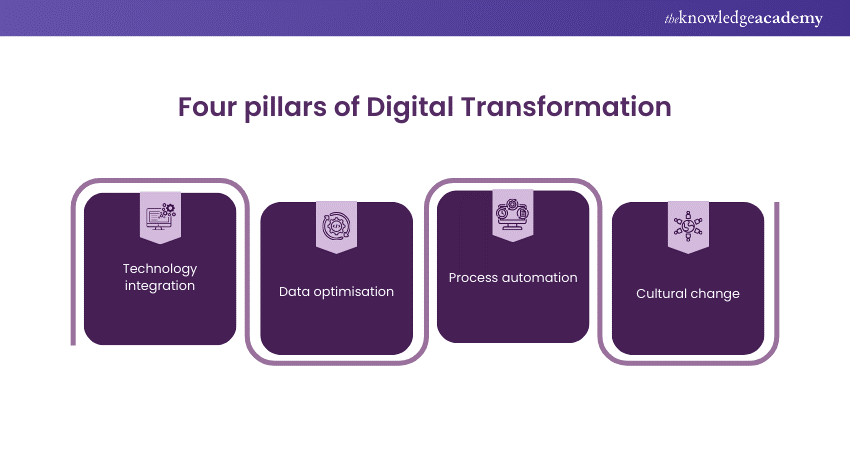
Sample Answer: The four pillars of Digital Transformation are the following: Technology integration, data optimisation, process automation and cultural change. Every pillar is important to fully make use of technology to boost business performance and results.
4) What factors are currently propelling Digital Transformation forward?
The interviewer wants to know your knowledge of the current Digital Transformation Trends or drivers of Digital Transformation.
Sample Answer: The main features that are involved in Digital Transformation today are the necessity for more business agility, the growth of big data and analytics, the rise of customer demand for digital services, and the competitive pressure to improve operational efficiency.
5) How do you determine which Digital Transformation projects to prioritise?
The interviewer wants to know how you can match the Digital Transformation priorities with the business objectives.
Sample Answer: I always choose which Digital Transformation project to work on first based on the potential they have in contributing to my organisation's strategic goals, their return on investment, and the urgency of the needs it addresses. This includes active communication and cooperation with the main stakeholders to make sure that the business’s general goals are achieved.
6) What approaches do you use to ensure the sustainability and lasting impact of Digital Transformation efforts?
The interviewer wants to know your approaches to making Digital Transformation projects durable and successful.
Sample Answer: By integrating digital skills across the organisation, I concentrate on creating a culture of continuous improvement and innovation. By evaluating the impact of our initiatives, I can adjust our strategy if necessary.
7) What challenges are most common in Digital Transformation processes?
The interviewer wants to check if you understand the common obstacles faced during Digital Transformations.
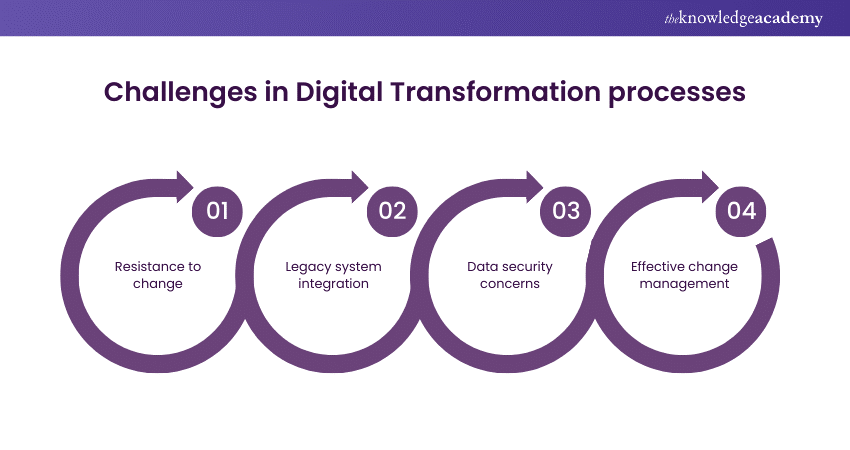
Sample Answer: The most common challenges include cultural resistance to change, integrating new technologies with legacy systems, and maintaining data security and privacy. Overcoming these requires strategic planning, effective change management, and continuous stakeholder engagement.
8) What type of organisational culture supports Digital Transformation?
The interviewer wants to know what cultural attributes you think support effective Digital Transformation.
Sample Answer: A culture that supports Digital Transformation values flexibility, learning, and innovation. It encourages risk-taking, values data-driven decision-making, and fosters collaboration across departments.
9) How do you assess the effectiveness of Digital Transformation initiatives?
The interviewer seeks to understand how you measure success in Digital Transformation projects.
Sample Answer: The effectiveness of Digital Transformation initiatives can be measured through several metrics, such as improved customer satisfaction, increased operational efficiency, and growth in digital revenue streams. Regularly reviewing these metrics ensures we are achieving the desired outcomes.
10) What role does Digital Transformation play in a company's strategic planning?
The interviewer wants to know your understanding of how Digital Transformation Integrates with overall business strategy.
Sample Answer: Digital Transformation is integral to strategic planning as it enables businesses to respond quickly to market changes, innovate, and maintain competitive advantage. It helps identify new business opportunities and streamline operations to achieve strategic goals more effectively.
11) How do you align Digital Transformation projects with organisational objectives and values?
The interviewer wants to know how you ensure digital projects support the broader goals and values of the company.
Sample Answer: Aligning Digital Transformation projects with organisational objectives involves regular communication with stakeholders to understand their needs and goals. This ensures that every digital initiative supports the overarching business objectives and remains true to our core values. Continuous dialogue helps in tailoring digital strategies that are not only effective but also resonate with the values we uphold as a company, thus fostering a supportive and integrated approach to digital change.
12) What formal training or certifications in Digital Transformation do you possess?
The interviewer wants to check your educational background and qualifications related to Digital Transformation.
Sample Answer: I hold a Certification in Digital Business Transformation Management, which covers strategic planning, digital marketing, and technology management. This has equipped me with the insights and skills needed to lead effective digital strategies.
13) Under what circumstances might a Digital Transformation project not yield the expected results?
The interviewer wants to know the potential reasons for failure in digital projects.
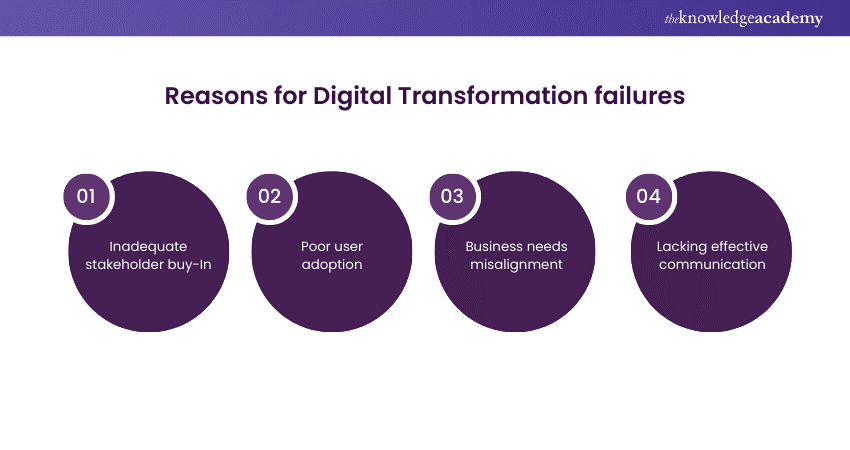
Sample Answer: Digital Transformation projects may not be successful if stakeholder buy-in is low, users do not adopt the project, or it is not aligned with business needs. Communication and training are the key points to avoid these flaws.
14) How do you foster innovation within a team during a Digital Transformation?
The interviewer wants to know your methods of promoting creative thinking and innovation among the team members.
Sample Answer: To create innovation during Digital Transformations, I promote an atmosphere of open communication where all team members feel appreciated for their opinions. I organise regular brainstorming sessions that concentrate on solving real-world problems through digital solutions. I prioritise keeping myself updated on emerging Digital Transformation Technologies that could be a source of new approaches.
15) Why is it important for companies to pursue Digital Transformation?
The interviewer asks for an explanation of the significance of Digital Transformation.
Sample Answer: Digital Transformation is the key for companies to improve their efficiency, boost customer satisfaction and stay ahead of the competition in a fast-changing digital economy. It allows companies to take advantage of the latest technology and to innovate more efficiently.
Understand how to build and implement an AI system in an organisation with our Artificial Intelligence (AI) For Project Managers Course – join today!
16) What key skills should a leader in Digital Transformation possess?
The interviewer wants to check what competencies you believe are crucial for a leader in this field.
Sample Answer: A Digital Transformation leader should have strong strategic thinking, adept change management abilities, and profound technological literacy. They must also excel in communication and stakeholder engagement to drive organisational change.
17) Have you used business analytics software in your previous roles?
The interviewer wants to know about your practical experience with analytics tools.
Sample Answer: Yes, in my last role, I regularly used SAP Business Analytics to gather insights from our operations, which helped in making informed decisions and improving process efficiencies.
18) What are the primary obstacles leaders face when implementing Digital Transformation strategies?
The interviewer wants to check your perspective on the obstacles leaders might encounter.
Sample Answer: Leaders often face issues such as aligning department goals with the digital strategy, managing resource allocation, and overcoming resistance to change. Effective leadership involves proactive communication and inclusive strategy formulation.
19) How do you check that Digital Transformation initiatives complement the core business strategy?
The interviewer wants to check how you integrate digital projects with the main business strategy.
Sample Answer: I ensure that digital initiatives are in line with core business strategies by developing them in close collaboration with key stakeholders and aligning them with our long-term business objectives and market positioning.
20) How can managers and leaders nurture and develop talent in the context of Digital Transformation?
The interviewer wants to know your approach to talent development within Digital Transformation.
Sample Answer: Leaders can develop talent by fostering continuous learning and innovation, providing training in new digital skills, and encouraging cross-functional team collaborations to expose staff to diverse aspects of digital projects.
21) How do you keep up with rapid technological advancements affecting Digital Transformation?
The interviewer wants to check how you stay informed and current in a fast-paced tech environment.
Sample Answer: I stay updated with technological advancements by regularly attending industry workshops, participating in webinars, and reading authoritative publications in the field of Digital Transformation and technology.
22. How do you leverage data analytics and business intelligence to inform transformation decisions?
The interviewer wants to understand how you use Data in Digital Transformation to support decision-making in transformation projects.
Sample Answer: I utilise data analytics and business intelligence tools to derive actionable insights that inform our Digital Transformation strategies. This involves analysing customer behaviour, operational processes, and market trends to ensure our decisions are data-driven.
23) What implications does Digital Transformation have for business executives?
The interviewer wants to see if you understand the strategic implications for top management.
Sample Answer: For business executives, Digital Transformation represents both a challenge and an opportunity. It requires them to rethink business models and strategies while also offering new avenues for innovation and competitive advantage.
24) In what ways does Digital Transformation affect leaders and managers without a technical background?
The interviewer wants to know how Digital Transformation impacts non-technical leaders.
Sample Answer: Digital Transformation challenges non-technical leaders to quickly adapt and understand new technologies. It necessitates learning basic tech skills and concepts to manage and lead digital projects effectively.
25) What are the risks of neglecting Digital Transformation?
The interviewer wants to know the potential negative consequences of ignoring Digital Transformation.
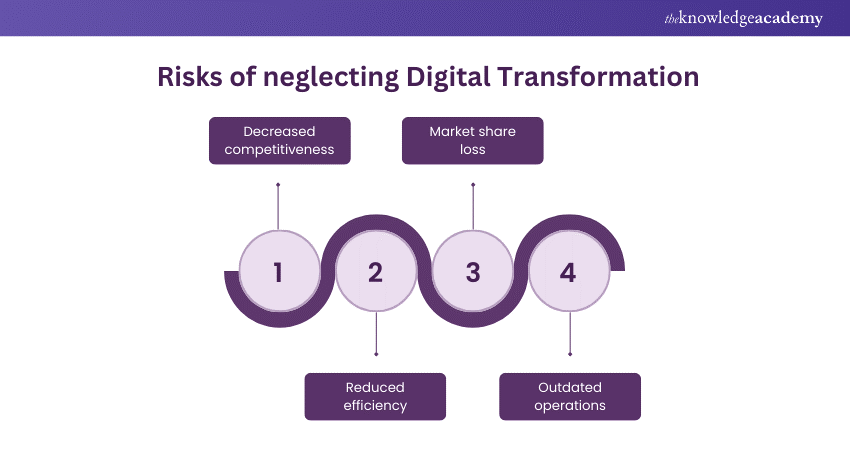
Sample Answer: Neglecting Digital Transformation can lead to decreased competitiveness, reduced efficiency, and a loss of market share as competitors leverage advanced technologies to optimise their operations and enhance customer experiences.
26) What methods do you employ to test products before they go to market?
The interviewer wants to know your approach to product testing in the digital context.
Sample Answer: I employ a combination of user testing sessions, A/B testing, and pilot launches in controlled environments to gather feedback and ensure product reliability and user satisfaction before full market release.
Learn how Artificial Intelligence can complement Business Analysis with our Artificial Intelligence (AI) for Business Analysts Course – join today!
27) How have you modified business models to facilitate Digital Transformation In previous roles?
The interviewer wants to know about your experience in adapting business models for Digital Transformation.
Sample Answer: In my previous role, I helped pivot our traditional retail business model to include an e-commerce platform. This involved integrating digital tools for inventory management, customer service, and online marketing, significantly broadening our market reach.
28) Could you discuss a particularly challenging Digital Transformation project and how you addressed the difficulties?
The interviewer wants to know your skills in problem-solving and resilience.
Sample Answer: In one project, we faced significant pushback from employees as we introduced a new digital workflow system. To address this, I initiated a comprehensive training program and set up a feedback loop that allowed employees to voice concerns and gradually eased the transition.
29) How can leaders enhance their Digital Transformation skills?
The interviewer wants to know how leaders can improve their competencies in leading Digital Transformations.
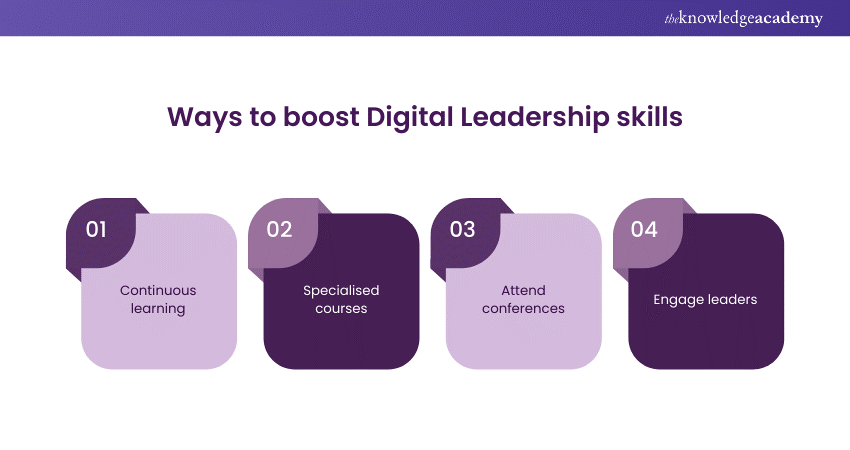
Sample Answer: Leaders can enhance their digital skills through continuous learning, such as taking specialised courses in digital strategy and technology management, attending relevant conferences, and engaging with thought leaders in the Digital Transformation space.
30) What's the best starting point for a company looking to embrace Digital Transformation?
The interviewer wants to check your approach to initiating Digital Transformation in an organisation.
Sample Answer: The best starting point is to conduct an assessment of current business processes and technology infrastructure to identify areas that can significantly benefit from digitisation. From there, developing a strategic plan that aligns with the company’s long-term goals is essential.
Conclusion
As we conclude our blog on Digital Transformation Interview Questions, effectively managing digital change's complexities is crucial for any leader in today's tech-driven world. These questions are designed to not only test technical knowledge but also to uncover a candidate's ability to think strategically and adapt in a rapidly evolving digital landscape.
Master current digital trends and technologies with our Digital Transformation Courses – join today!
Frequently Asked Questions
Upcoming Business Improvement Resources Batches & Dates
Date
 Digital Transformation Certification
Digital Transformation Certification
Wed 5th Feb 2025
Thu 27th Mar 2025
Wed 14th May 2025
Wed 3rd Sep 2025
Wed 3rd Dec 2025







 Top Rated Course
Top Rated Course


 If you wish to make any changes to your course, please
If you wish to make any changes to your course, please


